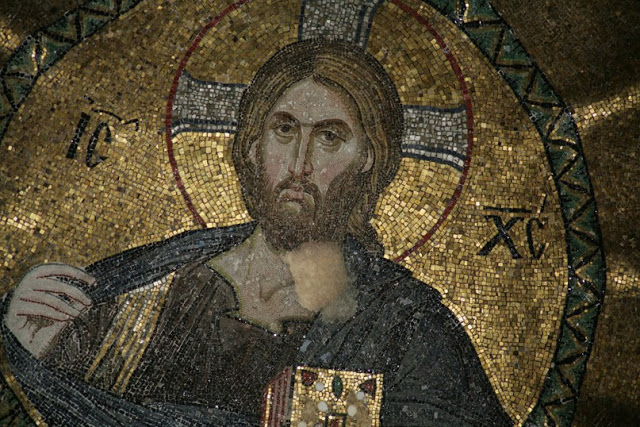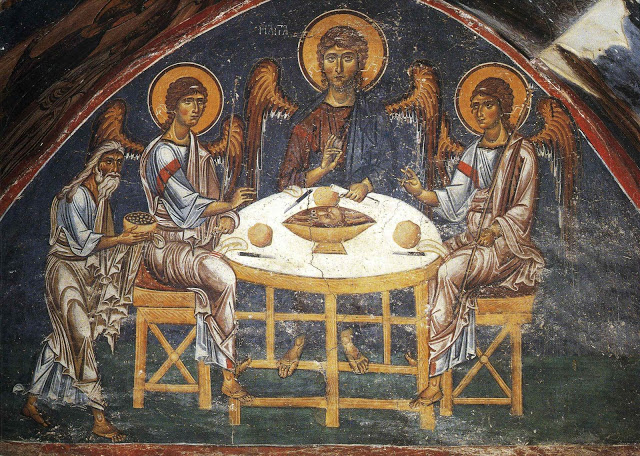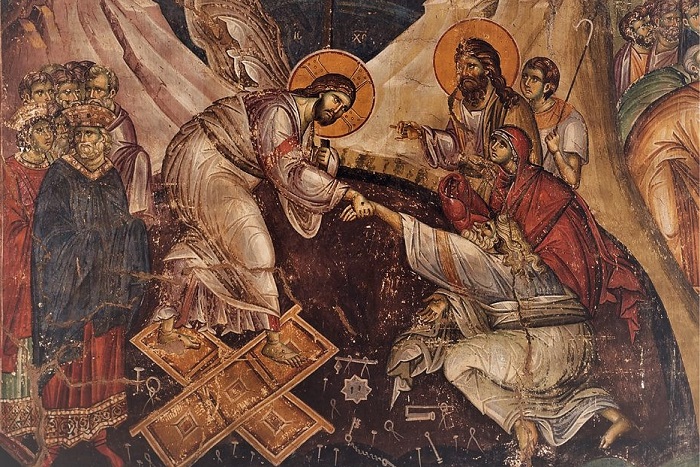
Today marks the 20th anniversary of my reception into the one, holy, catholic and apostolic Church — the Orthodox Church. I was just 22 years old at the time and still in college (I had something of a “career” in college, accumulating one BA, most of another, and three minors, all while working to support myself).
In 1998, April 19 was Pascha, and at that Pascha 20 years ago, it was between Matins and the Divine Liturgy, when I was received into the Holy Orthodox Church. 2018 was my 21st Pascha, including 12 as a presbyter. It never gets old but instead is newer every year. A lot has happened these past 20 years, and I can’t say that I really knew what to expect. There has been both pain and joy, both loss and gain, over the past two decades.
But I will say that this faith is deeper and stronger and more pervasive in its practice than I could have imagined in 1997 when I first learned of it. It is also both more difficult and more merciful than I could have known 20 years ago. I have a long ways to go, but here are six things that I’ve learned over the past couple decades, and I do hope that my old friend Chris (a cradle Catholic) will stop referring to me as a “recent convert” now. (Heheh.)
1. It’s way less work than I could have imagined.
My impression 20 years ago of Orthodoxy was that it was like a kind of life-long boot camp, in which one is constantly engaged in grueling effort — all that fasting (yes, we always mention the fasting first), prayer, long services, etc. — in order to repent of sin and acquire the Holy Spirit. When I was 22, the “hardcore” feeling of Orthodox Christianity is part of what drew me to it.
But eventually I found out that it becomes part of “normal” life. You don’t stay in boot camp forever. Eventually you get out on the ocean and have to just mind the ship. And that’s what most people do most of their time. Of course, there are periods (e.g., Lent or pilgrimages) when we kick it up a few notches, because we need to do that from time to time, but human beings can’t spend all their time at full intensity.
2. It’s way more work than I could have imagined.
When they said that Orthodox Christianity was about repentance, I didn’t really know what that meant. For sure, when I did my life confession before becoming Orthodox, I had a lot of sins that I confessed, many of which I was quite ashamed of. But I didn’t really know how many deep-seated tendencies toward selfishness, being closed off, anger, resentment (I could go on) I actually had. And I didn’t know how much practice it would take to see improvement on those things.
This is not to downplay God’s grace, of course. The point here is that God’s grace is freely available to those who freely reach for it. But I wasn’t very good at reaching for it 20 years ago, and I didn’t really even know that. I know it much better now, and I pray that, by grace, I am better at reaching for it.
3. It’s much deeper than I could have imagined.
When I became Orthodox at 22, I thought I understood Orthodox theology and practice pretty well. That’s why I became Orthodox, right? But here I am, 20 years later, with an M.Div. under my belt, with seminary 11 years in the rear-view mirror, with 11 years of priestly ministry, including 9 as a pastor, and there are still a lot of things I just don’t get. There are still a lot of things I’m just beginning to get.
I’ve had to learn to say “That just isn’t my field” when asked questions I’m not really qualified to answer. And I’ve also learned that there is still so much of this beautiful Kingdom to explore. Even with 20 years of Orthodox life behind me — nearly my entire adulthood — I feel like I’m just getting started! That’s a great feeling.
4. Prayer is much more than I could have imagined.
When I really began to start paying attention to just trying to keep a daily prayer rule, I noticed something. First, I should say that it was “easy” when I was 22 to say morning and evening prayers every day — no problem! But then at some point it wasn’t happening every day. And then I’d start again. And then I’d have long periods where I just didn’t actually pay much attention to it — including after ordination. What was so basic, easy and elementary at first became almost the whole of the struggle. Thank God, though, that He’s sent me guides to help me in this.
One of the things that I’ve seen clearly — some of it only just within the past few years — is that prayer actually does do something. It may not “do” the thing that I’m wanting, hoping or asking, but it really is an opening up of the person to the grace of God. One experiment that I did (at the behest of my confessor) was to notice how I felt at my worst times of day and then to see if there were any correlation between that experience and whether I prayed that morning. And you know what? There was!
Probably the biggest reason that I have been so inconsistent with daily prayer at times in my life is that I generally didn’t think it did anything. I had no problem being consistent with brushing my teeth, getting coffee, eating breakfast, etc., because I could see and measure the effects of doing those things. But I had never actually checked whether daily prayer did anything. Well, it does. In praying in the morning, I receive God’s protection from many temptations. I’m not perfect — far from it — but when I do that prayer, the day is observably different.
5. Parishes are much more different from each other than I could have imagined.
When I became Orthodox, I don’t think I’d even visited more than a couple other parishes than the one I was joining. I didn’t know how different the customs, the music and even the commitment levels could be from one parish to another.
I remember one of my first conscious moments of knowing that there were differences was when I was asked by a fellow seminarian why I was Antiochian (some 6.5 years after I became Orthodox). The answer was that it had been the parish closest to my house. His question presumed, however, that I had made some kind of conscious choice between different parishes and picked the tradition that suited me best.
I’ve now been an active member of 5 different parishes all within the same tradition, and wow! are they different from each other. Even the two “converty” parishes I’ve been part of are quite different from each other.
And now especially with getting a chance to do speaking engagements all over the country, I’ve seen a lot of different traditions and ways of doing things. The thing I’ve learned is that every parish is on a journey. None will remain exactly as they are. So when I become part of a parish’s life, even if it’s just for a day, I’m joining them on that
journey. I’ve also learned that experiencing other traditions and even other ways of brokenness is an enriching experience.
journey. I’ve also learned that experiencing other traditions and even other ways of brokenness is an enriching experience.

6. The only way to be an Orthodox Christian is to focus on Jesus Christ.
This might seem like a no-brainer, but honestly, 20 years ago, I don’t think I really knew that. I sort of assumed it, but focus isn’t made of assumptions. We have to keep returning to Jesus, exploring Who Jesus is, exploring how Who He is shapes everything in spiritual life. He is the One Who opens the door for us, the One Who is the Way, the One Who accompanies us on the journey, and the One Who is the destination. Everything is about Jesus Christ.
Possibly the most important thing to note about #1 and #2 above is that in both cases, what I had to learn was that spiritual life isn’t about making me a better person (however defined). It is about learning how to invite Christ more deeply into every part of myself.
And one of the most important lessons I’ve learned in this regard is that I can’t let myself become focused on the brokenness of either myself or other people within the Church. I recently watched a video of someone who visited an Orthodox church one time and decided not to be Orthodox because he experienced a particular kind of brokenness in that parish. He then extrapolated outward that brokenness is what the whole Orthodox Church is about. This man was looking at us from the outside, so it’s perhaps understandable how he could walk away with such a false sense, but those of us on the inside do it, too. We make our spiritual lives about the brokenness, and sometimes we walk away or just check out because of it — either because I can’t do it well enough myself or because those around me aren’t doing it well enough.
But it’s about Jesus. It always has been and always will be.




